History of Java and the difference between Oracle JDK and OpenJDK
1. A brief history of Java
Java was started by James Gosling and his colleagues at Sun Microsystems in 1991. It was originally from the idea of programming to control without relying on CPU used for electronic devices such as TVs, washing machines, microwaves, etc. Therefore, they embarked on building a fast, compact, efficient, device-independent language. Eventually, the "Oak" language was born, which was later renamed Java.
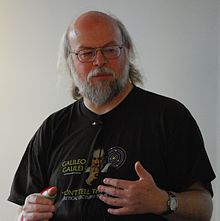
James Gosling
At first, Java was named "Oak" because they are commonly grown in the US, Germany, Romania, and so on. They are also considered as a symbol of that country and a symbol of power. Addictionally, around the office of James Gosling were a lot of oak trees also planted.

Oak tree
In 1995, Oak was renamed Java because the name Oak was previously registered by a company called Oak Technologies. In the same year, the first version of Java was born. In order to get the first Java version, Sun Microsystems engineers had been working very hard for 4 years, from 1991 to 1995. During this time they worked day and night, and drank a lot of Coffee and Tea. The drinks helped them a lot, the cups appeared in their office all the time.
Why was the name Java chosen?
There are many suggested names for the members to select, such as Dynamic, Revolutionary, Silk, Jolt, DNA, ... However, they wanted a name reflecting the true nature of technology, which is revolutionary, highly dynamic, unique, and easy to pronounce, etc.
Java is an island in Indonesia, where the first coffee product was produced (called java coffee). Moreover, coffee had been attached to the engineers working for 4 years to create the first version of Java. That is the reason why most of the team members chose Java and as a result, the Java logo is a smoky, flavorful coffee cup.
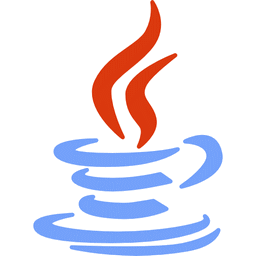
According to James Gosling, Java is one of the top choices along with Silk. However, due to the uniqueness of Java, most team members selected Java.
2. JVM and Slogan of Java
The biggest purpose of Java is how to write a program that can run on different platforms. Java's famous slogan is "Write Once and Run Anywhere - WORA".
Before Java was born, a program that was written and compiled into a machine code running on Windows operating systems would not be able to run on Linux operating systems because of a lot of differences.
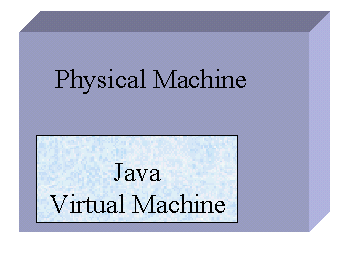
Sun Microsystems engineers had created JVM (Java Virtual Machine) to install on different platforms such as Windows, Linux, Mac, etc.

Java-written programs are compiled into Byte Code, a special code that can run in the JVM environment. JVM helps translate Byte Codes into the host machine's codes. This is the principle which explains why Java can run on different platforms.
3. What are JDK and JRE?
JRE
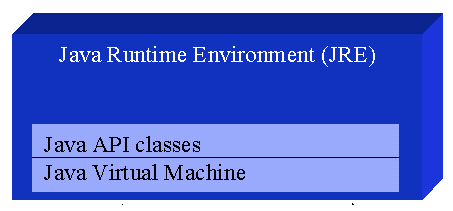
JRE is short for Java Runtime Environment, which includes JVM (Java Virtual Machine) and a number of Java libraries that support to execute programs written in the Java language.
JDK
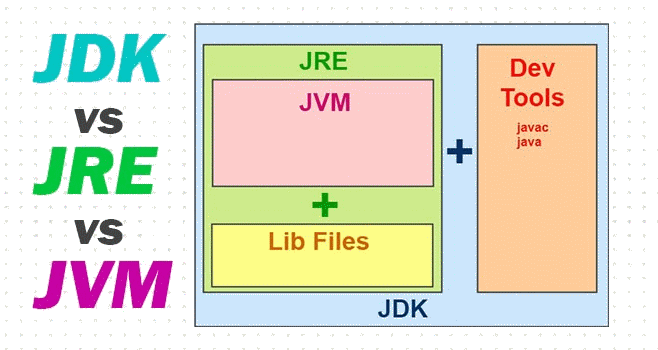
JDK stands for Java Development Kit, which consists of 2 components, JRE and Java Development Tools.
JDK is necessary for programmers because Java Development Tools provides tools for Java application development, such as Javac which compile the developer's source codes into Byte Codes, etc. then uses JRE to run the application during the development process.
4. OpenJDK vs Oracle JDK
The table below describes the history of different Java versions.
Version | Release
date | End of Free
Public Updates | Extended
Support Until |
JDK Beta | 1995 | ? | ? |
JDK 1.0 | January 1996 | ? | ? |
JDK 1.1 | February 1997 | ? | ? |
J2SE 1.2 | December 1998 | ? | ? |
J2SE 1.3 | May 2000 | ? | ? |
J2SE 1.4 | February 2002 | October 2008 | February 2013 |
J2SE 5.0 | September 2004 | November 2009 | April 2015 |
Java SE 6 | December 2006 | April 2013 | December 2018 |
Java SE 7 | July 2011 | April 2015 | July 2022 |
Java SE 8 (LTS) | March 2014 | January 2019 for Oracle (commercial) December 2020 for Oracle (personal use) At least September 2023 for AdoptOpenJDK At least June 2023 for Amazon Corretto | December 2030 |
Java SE 9 | September 2017 | March 2018 for OpenJDK | N/A |
Java SE 10 | March 2018 | September 2018 for OpenJDK | N/A |
Java SE 11 (LTS) | September 2018 | At least August 2024 for Amazon Corretto
September 2022 for AdoptOpenJDK | September 2026 |
Java SE 12 | March 2019 | September 2019 for OpenJDK | N/A |
Java SE 13 | September 2019 | March 2020 for OpenJDK | N/A |
Java SE 14 | March 2020 | September 2020 for OpenJDK | N/A |
Java SE 15 | September 2020 | March 2021 for OpenJDK | N/A |
Java SE 16 | March 2021 | September 2021 for OpenJDK | N/A |
Java SE 17 (LTS) | September 2021 | TBA | TBA |
In a major event in October 2009, Oracle purchased Sun Microsystem. Since then Java officially changed its owner. Please pay full attention to before and after 2009.
From the first to the sixth Java versions were developed by Sun Microsystem, they opened Java source code for everyone in the world.
In July 2011, Oracle released Java 7. Two different JDK variants, Oracle JDK and OpenJDK were also available at the time when the source code of these two variants did not make too many differences, because they were both inherited from JDK 6.
OpenJDK
OpenJDK is opened source code, it is maintained and developed by Oracle, but allows communities and other companies to participate in this development, such as Red Hat, Azul Systems, IBM, Apple Inc, etc. OpenJDK is both a JDK product and a specification, any company or organization that wants to use OpenJDK to create a new variant must comply with those specifications.
OpenJDK is developed by Oracle and the community contributions. We sometimes have issues on its stability; however, based on user feedback, it will be upgraded to perform better. OpenJDK is regularly updated, around every 6 months.
Oracle JDK
Oracle JDK is maintained and developed by Oracle. It complieswith OpenJDK specifications, but it is not opened source code. Oracle JDK is much better in terms of the JVM responsiveness and productivity. It focuses more on the stability due to its importance to the corporate customers.
You might be asking the question, "What is a specification?". Let's see an example, an organization defines the size of a bicycle tire, which is a specification, and a manufacturer needs to comply with that regulation, whereas, the specification doesn't care how the manufacturer makes the tires.
OpenJDK was released under the "GPL v2" license, while Oracle JDK was released under the "Oracle Binary Code License Agreement".
Java Basic
- Customize java compiler processing your Annotation (Annotation Processing Tool)
- Java Programming for team using Eclipse and SVN
- Java WeakReference Tutorial with Examples
- Java PhantomReference Tutorial with Examples
- Java Compression and Decompression Tutorial with Examples
- Configuring Eclipse to use the JDK instead of JRE
- Java String.format() and printf() methods
- Syntax and new features in Java 8
- Java Regular Expressions Tutorial with Examples
- Java Multithreading Programming Tutorial with Examples
- JDBC Driver Libraries for different types of database in Java
- Java JDBC Tutorial with Examples
- Get the values of the columns automatically increment when Insert a record using JDBC
- Java Stream Tutorial with Examples
- Java Functional Interface Tutorial with Examples
- Introduction to the Raspberry Pi
- Java Predicate Tutorial with Examples
- Abstract class and Interface in Java
- Access modifiers in Java
- Java Enums Tutorial with Examples
- Java Annotations Tutorial with Examples
- Comparing and Sorting in Java
- Java String, StringBuffer and StringBuilder Tutorial with Examples
- Java Exception Handling Tutorial with Examples
- Java Generics Tutorial with Examples
- Manipulating files and directories in Java
- Java BiPredicate Tutorial with Examples
- Java Consumer Tutorial with Examples
- Java BiConsumer Tutorial with Examples
- What is needed to get started with Java?
- History of Java and the difference between Oracle JDK and OpenJDK
- Install Java on Windows
- Install Java on Ubuntu
- Install OpenJDK on Ubuntu
- Install Eclipse
- Install Eclipse on Ubuntu
- Quick Learning Java for beginners
- History of bits and bytes in computer science
- Data Types in java
- Bitwise Operations
- if else statement in java
- Switch Statement in Java
- Loops in Java
- Arrays in Java
- JDK Javadoc in CHM format
- Inheritance and polymorphism in Java
- Java Function Tutorial with Examples
- Java BiFunction Tutorial with Examples
- Example of Java encoding and decoding using Apache Base64
- Java Reflection Tutorial with Examples
- Java remote method invocation - Java RMI Tutorial with Examples
- Java Socket Programming Tutorial with Examples
- Which Platform Should You Choose for Developing Java Desktop Applications?
- Java Commons IO Tutorial with Examples
- Java Commons Email Tutorial with Examples
- Java Commons Logging Tutorial with Examples
- Understanding Java System.identityHashCode, Object.hashCode and Object.equals
- Java SoftReference Tutorial with Examples
- Java Supplier Tutorial with Examples
- Java Aspect Oriented Programming with AspectJ (AOP)
Show More
- Java Servlet/Jsp Tutorials
- Java Collections Framework Tutorials
- Java API for HTML & XML
- Java IO Tutorials
- Java Date Time Tutorials
- Spring Boot Tutorials
- Maven Tutorials
- Gradle Tutorials
- Java Web Services Tutorials
- Java SWT Tutorials
- JavaFX Tutorials
- Java Oracle ADF Tutorials
- Struts2 Framework Tutorials
- Spring Cloud Tutorials